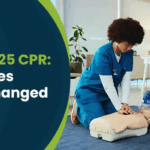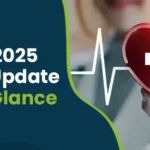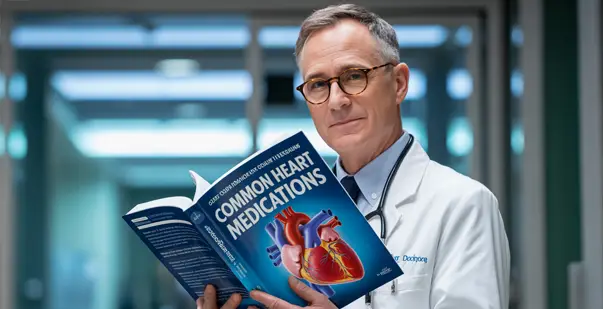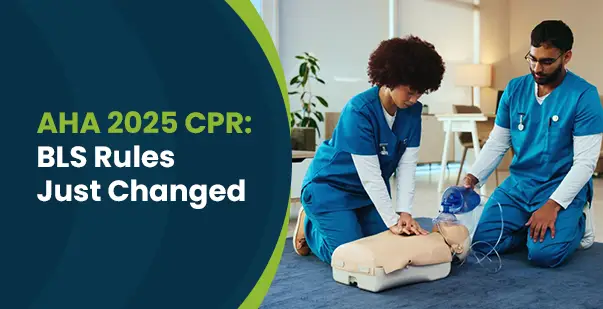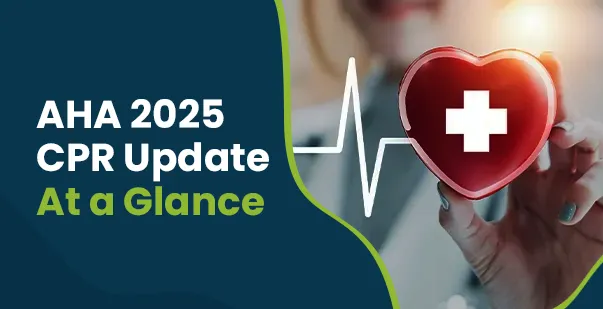A CDC factsheet states that heart disease is the leading cause of death in the U.S., responsible for nearly one in five deaths each year. To manage it effectively, you require lifelong prescription medications. Yet a study in the New England Journal of Medicine found that up to half of Americans don’t take their prescribed drugs. This alarming gap in adherence reflects a serious lack of patient awareness and puts those with heart conditions at greater risk.
Cardiac patients depend on heart medications to keep their hearts working well. They manage blood pressure and cholesterol levels and prevent clots. These lifesaving drugs also regulate heartbeats to keep the heart healthy.
Knowledge about these medications helps you identify which type suits your cardiac needs and their side effects. Scroll down to become an aware caregiver by understanding the types of heart medications and their uses.
9 Common Types Of Heart Medications
Heart medications treat different heart issues by performing diverse functions. Some control blood pressure, while others thin the blood or fix heart rhythms. Each drug serves a purpose in keeping the heart working well. In this overview, we’ll explore each type of drug, how they work, what they’re used for, and their potential side effects:
How Statins Lower Cholesterol
These medicines help lower the amount of bad cholesterol in your blood. This reduces the buildup of fatty deposits (plaque) in your arteries, which can lead to heart problems. Statins are the most common type. They work by blocking a substance in the liver that makes cholesterol.
Common examples of statins are
- Atorvastatin (Lipitor)
- Simvastatin (Zocor)
- Rosuvastatin (Crestor)
- Pravastatin (Pravachol)
Other cholesterol-lowering medications include
- Ezetimibe (Zetia) reduces the absorption of cholesterol from food
- PCSK9 inhibitors like evolocumab (Repatha)
- Bile acid sequestrants such as cholestyramine
LDL is often called “bad” cholesterol because it contributes to plaque buildup, while HDL is the “good” cholesterol that can remove LDL from your bloodstream. Doctors prescribe these medications to people with high levels of LDL (or “bad”) cholesterol. This includes those at risk of heart disease and patients who have already had a heart attack or stroke.
According to a 2023 study published in the Harvard Health Publishing, HMG-CoA reductase inhibitors (commonly known as statins) can reduce the risk of heart attacks by 25-35%. These work phenomenally for high-risk individuals and are most effective when taken at night.
These medicines are usually part of a complete treatment plan that also includes healthy eating and regular exercise. While most people tolerate statins well, some experience muscle pain, liver effects, or slightly increased blood sugar.
ACE Inhibitors (Angiotensin-Converting Enzyme Inhibitors)
Alongside statins, ACE inhibitors are another common class of heart medications. They are useful in treating high blood pressure and heart failure. When this chemical is reduced, your blood flows more easily, and your heart doesn’t have to work as hard. Common ACE inhibitors include
- Lisinopril (Prinivil, Zestril)
- Enalapril (Vasotec)
- Ramipril (Altace)
- Benazepril (Lotensin)
Doctors prescribe these medications for high blood pressure, heart failure, and to protect the kidneys in people with diabetes or those who have had a heart attack. They also help reduce the risk of future heart problems in patients with coronary artery disease.
Side Effects of ACE
Here are the possible side effects that you may face if your heart meds include ACE inhibitors:
- Dry cough: occurs due to the buildup of bradykinin, a natural chemical that can irritate the airways
- Dizziness: especially when standing up quickly (due to lowered blood pressure)
- Increased potassium levels: may require monitoring
- Fatigue: usually mild and temporary
- Swelling of the face, lips, or throat (angioedema): rare but serious, requires immediate medical attention.
If a dry cough becomes bothersome, doctors may switch you to an ARB, which provides similar benefits without this side effect.
Angiotensin II Receptor Blockers (ARBs)
ARBs work in a similar way to ACE inhibitors. They both help lower blood pressure and reduce strain on the heart. However, they act at a different point in the process. Instead of blocking the production of angiotensin II, ARBs block its action by preventing it from binding to receptors on blood vessels. This keeps blood vessels relaxed and open.
Why switch from ACE inhibitors to ARBs?
Some people who take ACE inhibitors experience a persistent dry cough or, in rare cases, swelling (angioedema). ARBs offer the same heart-protective benefits without these side effects, making them a suitable alternative.
The table below compares the two:
| Feature | ACE Inhibitors | ARBs |
| Mechanism | Blocks the production of angiotensin II | Blocks angiotensin II from binding |
| Common examples | Lisinopril, Enalapril | Losartan, Valsartan |
| Dry cough | Common side effects | Rare |
| Angioedema risk | Slightly higher | Lower |
| Use in heart failure/BP | Yes | Yes |
Common ARBs include:
- Losartan (Cozaar)
- Valsartan (Diovan)
- Irbesartan (Avapro)
- Candesartan (Atacand)
Doctors prescribe ARBs for high blood pressure, heart failure, and kidney protection in diabetes. They often serve as alternatives for patients who cannot tolerate ACE inhibitors due to cough or other side effects. As heart disease and kidney disease often go hand in hand, ARBs help protect both organs, which is especially important for diabetic patients.
ARBs tend to cause fewer side effects than ACE inhibitors. However, they may still cause dizziness, headaches, and, rarely, high potassium levels in the blood.
Beta Blockers
Adrenaline makes your heart beat faster and harder. Beta blockers reduce the heart’s workload by blocking the effects of adrenaline (epinephrine) on beta receptors in the heart. This slows the heart rate and reduces the force of heart contractions, lowering blood pressure and reducing oxygen demand.
Types of Beta Blockers
Beta blockers can be classified based on their receptor selectivity:
- Selective beta-blockers: These primarily affect the heart
- Metoprolol (Lopressor, Toprol-XL)
- Atenolol (Tenormin)
- Metoprolol (Lopressor, Toprol-XL)
- Non-selective beta-blockers: These affect the heart and other tissues
- Propranolol (Inderal) (crosses the blood-brain barrier, so it’s also used to treat anxiety)
- Carvedilol (Coreg)
- Propranolol (Inderal) (crosses the blood-brain barrier, so it’s also used to treat anxiety)
Doctors prescribe these medications for high blood pressure, heart failure, and abnormal heart rhythms. According to a study published in the Current Cardiology Reviews, beta blockers can reduce the risk of death after a heart attack by up to 30% when taken long-term. They can also prevent future heart attacks in those who have already had one.
Side Effects Warnings:
While beta blockers have many benefits, they can also cause side effects and require precautions:
- Common: Fatigue, cold hands or feet, sleep disturbances
- Diabetes warning: Can mask hypoglycemia symptoms. So, you should monitor your blood sugar closely if you have diabetes
- Caution in asthma or COPD: Non-selective agents may worsen breathing
Regular follow-up and dose adjustments help balance benefits with potential side effects.
Calcium Channel Blockers
Calcium has an important role in muscle contraction, including the muscles in your heart and blood vessels. These medicines stop calcium from entering the cells of your heart and blood vessels. This helps the blood vessels relax and widen, making it easier for your heart to pump blood and lowering your blood pressure.
Calcium channel blockers fall into two main groups:
- Dihydropyridines (primarily affect blood vessels):
- Amlodipine (Norvasc)
- Nifedipine (Procardia)
- Felodipine (Plendil)
- Non-dihydropyridines (affect both heart and vessels):
- Diltiazem (Cardizem)
- Verapamil (Verelan)
Doctors prescribe these medications for:
- High blood pressure (all agents)
- Angina relief (stable and variant/Prinzmetal’s angina)
- Certain heart rhythm problems (mainly non-dihydropyridines)
Different types of calcium channel blockers affect the heart and blood vessels differently. Some slow the heart rate and reduce contraction force, while others mainly affect blood vessels. Side effects may include headaches, swelling in the ankles and feet, constipation, and dizziness.
Anticoagulants and Antiplatelets
Anticoagulants, such as novel oral anticoagulants (NOACs) like apixaban and rivaroxaban, or older drugs like warfarin, help prevent blood clots from forming or getting bigger inside your vessels. They are also called “blood thinners,” but they don’t thin your blood. Instead, they slow down or block the blood’s natural clotting process.
Anticoagulants work by interrupting the chemical process that forms clots. These include:
- Warfarin (Coumadin)
- Heparin
- Apixaban (Eliquis)
- Rivaroxaban (Xarelto)
- Dabigatran (Pradaxa)
Antiplatelet drugs (like aspirin or clopidogrel) work alongside anticoagulants by stopping platelets from sticking together and forming clots. Common examples are
- Aspirin
- Clopidogrel (Plavix)
- Ticagrelor (Brilinta)
Doctors prescribe these medications for conditions with high clot risk. These include atrial fibrillation (irregular heartbeat), deep vein thrombosis (leg clots), pulmonary embolism (lung clots), mechanical heart valves, and after certain heart procedures. According to the American Heart Association, AFib alone affects about 5 million adults in the U.S. and raises stroke risk by five times. Anticoagulants can reduce that risk by up to 60%. They are also used after certain heart procedures, like placing a stent or getting a mechanical heart valve, to prevent clots from forming on or around the device.
These medications require careful monitoring as they increase bleeding risk. Patients taking them should watch for unusual bleeding or bruising and inform all healthcare providers about this medication before any procedure.
Diuretics
Diuretics, commonly known as “water pills,” help your kidneys remove excess salt and water through urine. This reduces blood volume, easing the pressure inside your blood vessels and lowering blood pressure. It also decreases the strain on your heart.
Doctors often prescribe diuretics for:
- High blood pressure (especially mild cases)
- Heart failure (to reduce fluid buildup in the legs, feet, and lungs)
They are often used alone or in combination with other heart medications for enhanced effect.
Types of Diuretics
Diuretics fall into three main classes, each working differently:
| Class | Common Drugs | Key Use | Potassium Effect |
| Thiazide | Hydrochlorothiazide (Microzide), Chlorthalidone | First-line for high BP | ↓ Potassium (may cause loss) |
| Loop | Furosemide (Lasix) | Fluid overload in heart failure | ↓ Potassium (can be severe) |
| Potassium-sparing | Spironolactone (Aldactone) | Often added to counter potassium loss | ↑ Potassium (can cause excess) |
Common Side Effects
- Increased urination
- Dehydration
- Electrolyte imbalance (especially potassium)
- Loop and thiazide diuretics can cause low potassium (↓K⁺)
- Spironolactone may cause high potassium (↑K⁺)
- Gout flare-ups (especially with thiazides and in patients with prior gout)
Your doctor will regularly check your blood potassium levels and may recommend dietary changes or potassium supplements as needed. Staying hydrated and reporting any new symptoms, like muscle cramps or joint pain, is essential while on these medications.
Antiarrhythmic Medications
Antiarrhythmic medications help control irregular heart rhythms (arrhythmias) by affecting the electrical signals that coordinate your heartbeat. These medications are categorized into different classes based on how they work.
- Class I agents (like flecainide and propafenone) slow electrical conduction.
- Class II agents are beta blockers we discussed earlier.
- Class III agents (such as amiodarone, sotalol, and dofetilide) prolong the heart’s recovery time between beats.
- Class IV agents are calcium channel blockers that specifically affect the heart’s electrical pathways.
Doctors prescribe antiarrhythmics for conditions like atrial fibrillation, atrial flutter, ventricular tachycardia, and other heart rhythm disorders. The choice depends on your specific arrhythmia, other health conditions, and potential side effects.
These medications require careful monitoring as they can sometimes cause new rhythm problems (a phenomenon called “proarrhythmia”). It is more common in patients with structural heart disease (like scarring from a prior heart attack). For example:
- QT interval prolongation (seen with Class III drugs like amiodarone) can lead to torsades de pointes.
- QRS widening (seen with Class IC agents such as flecainide) reflects slowed ventricular conduction.
- PR interval prolongation or AV block (seen with beta-blockers and some calcium channel blockers) shows slowed electrical signals through the AV node.
Regular check-ups and ECGs help catch these changes early. Blood tests may also be needed, and drugs like amiodarone often require extra monitoring of thyroid, liver, and lung function.
Read More: A Complete Guide to Cardiac Arrhythmia and Treatment
Aldosterone Antagonists
Aldosterone antagonists block the effects of aldosterone, a hormone that can cause your body to retain salt and water while losing potassium. By blocking this hormone, these medications help your body maintain better fluid and electrolyte balance.
The main medications in this class are:
- Spironolactone (Aldactone)
- Eplerenone (Inspra)
While technically diuretics, they work differently from traditional water pills and have unique benefits for improved heart health beyond their diuretic effect.
Doctors prescribe aldosterone antagonists for heart failure patients who are already taking ACE inhibitors and beta blockers but still have symptoms. They are also used for certain types of high blood pressure, particularly resistant hypertension that does not respond well to other medications. These medications help protect the heart from the damaging effects of excessive aldosterone, which can cause heart and blood vessel scarring.
Quick Comparison of Drug Classes
The table below compares these 9 drug classes:
| Drug Class | Common Drugs | Purpose | Common Side Effects | When It’s Prescribed |
| ACE Inhibitors | Lisinopri Enalapri Ramipril | Lower blood pressure and reduce heart workload | Dry cough Dizziness High potassium levels | High blood pressure Heart failure After a heart attack |
| Beta Blockers | Metoprolol Carvedilol Atenolol | Slow heart rate and lower blood pressure | Fatigue Cold hands/feet Dizziness | High blood pressure Chest pain Heart rhythm problems |
| Calcium Channel Blockers | Amlodipine Diltiazem Verapamil | Relax blood vesselsand reduce heart workload | Swollen ankles Constipation Dizziness | High blood pressure Chest pain Heart rhythm disorders |
| Diuretics | Furosemide Hydrochlorothiazide Spironolactone | Remove extra water and salt from the body | Frequent urination Low potassium Dehydration | Heart failure High blood pressure Fluid buildup |
| Statins | Atorvastatin Simvastatin Rosuvastatin | Lower cholesterol levels in the blood | Muscle pain Liver problems Digestive issues | High cholesterol Heart disease prevention |
| Blood Thinners | Warfarin Apixaban Rivaroxaban | Prevent blood clots from forming | Easy bleeding Bruising Stomach upset | Atrial fibrillation Blood clot history Artificial heart valves |
| Nitrates | Nitroglyceri Isosorbide Mononitrate | Open blood vessels to improve blood flow | Headache Dizziness Flushing | Chest pain Angina attacks Heart failure |
| Antiarrhythmics | Amiodarone Flecainide Sotalol | Control abnormal heart rhythms | Nausea Vision changes Thyroid problems | Irregular heartbeat Atrial fibrillation Dangerous arrhythmias |
| Digitalis | Digoxin Digitoxin | Strengthen heart contractions and slow heart rate | Nausea Vision problems Confusion | Heart failure Certain heart rhythm problems |
Considerations When Taking Heart Medications
Taking your heart medications exactly as prescribed is important for their effectiveness. Skipping doses or stopping medications without consulting your doctor can lead to serious consequences. These may worsen the heart function, increase blood pressure, or cause heart attacks and strokes.
Below are key points to keep in mind when managing your heart medications:
Medication Interactions
Heart failure medications can interact with:
- Other prescription medications
- Over-the-counter drugs
- Herbal supplements
- Certain foods
Side Effects
All medications can cause side effects, though many people take heart failure medications without prominent problems. Some side effects can be temporary and may improve as your body adjusts, while others might require medical attention.
Monitoring & Follow-ups
Many heart medications require regular checkups and tests to ensure they’re working properly and not causing unwanted effects. These tests help your healthcare team adjust dosages for maximum benefit with minimum risk. Missing these appointments can lead to undetected problems or less effective treatment.
Food Considerations
People taking warfarin need consistent vitamin K intake (found in green leafy vegetables) because dramatic changes can affect blood clotting. Grapefruit can increase the concentration of some statins and calcium channel blockers in your blood by interfering with their CYP3A4 metabolism.
Adherence tips
To help you stay on track with your heart medications, try these practical strategies:
- Use a weekly pill organizer with clearly labeled morning and evening compartments to prevent missed or doubled doses.
- Set reminders on your phone or use a medication app that alerts you and logs each dose you take.
- Link your medication schedule to a daily habit to build consistency.
Read More: How to Improve Heart Health Quickly and Naturally
When to Call Your Doctor?
You must know the warning signs that require immediate medical attention concerning your heart condition. Look out for these symptoms and report immediately to your doctor for prompt care and professional intervention:
Severe Dizziness or Fainting
If you feel lightheaded to the point of collapsing, this could signal dangerously low blood pressure or a heart rhythm problem. This means your heart may not be pumping blood properly throughout your body.
Unexplained Swelling
Sudden swelling in your legs, ankles, or abdomen can indicate fluid buildup due to heart failure or kidney issues. If you notice puffiness without changing your diet or activity levels, contact your doctor right away.
Bleeding or Bruising with Blood Thinners
Blood thinners prevent dangerous clots but also raise bleeding risk. Large bruises without injury, nosebleeds, blood in your urine or stool, or excessive bleeding from minor cuts all require immediate medical attention.
Rapid Weight Gain
Gaining 2-3 pounds in one day or 5 pounds in one week often points to fluid retention. In heart failure patients, excess fluid puts extra strain on the heart and can create a dangerous situation that needs prompt treatment.
How to Remember to Take Your Heart Meds
Forgetting to take your heart medications can seriously affect your treatment results. Yet, medication adherence is a common challenge, especially when managing multiple prescriptions or doses throughout the day. Here are some simple tips to stay on track:
Set Daily Reminders
Use phone alarms or calendar alerts to remind you when it’s time to take your medicine. Keeping the timing consistent, like with meals or bedtime, also helps build the habit.
Use a Pill Organizer
Weekly or daily pillboxes with labeled compartments make it easier to track what you’ve taken and what you haven’t. They are especially helpful if you are on more than one medication.
Download a Medication Tracker App
Apps like Medisafe or MyTherapy can send reminders, log doses, and even alert a caregiver if you miss one. Most are free and easy to use on smartphones.
Involve a Family Member or Caregiver
If you are forgetful, overwhelmed, or managing medications after surgery or hospitalization, having someone help with reminders can make a big difference.
Keep Meds Visible and Accessible
Store your medications somewhere you’ll see them, like near your toothbrush or coffee mug. Just avoid high-humidity areas like bathrooms, which may reduce potency.
Choose the Right Medication for a Healthy Heart!
Heart medications play a key role in heart disease treatment. These drugs help manage heart conditions and improve quality of life. Always know the names of your heart medications, doses, reasons for each drug, and report any side effects right away. To stay on top of your treatment, consider telemedicine or pharmacy consultations. These options can be a real lifesaver, especially for older adults or anyone living in rural areas.
Even the most effective heart drug won’t reach its full potential without healthy habits. Combine your treatment plan with a heart-healthy diet. You can include the DASH or Mediterranean eating plans, at least 30 minutes of activity each day, and a commitment to quit smoking.
And while you’re taking steps to protect your heart, consider one more: learning CPR. Talk to your healthcare provider or explore a reputable CPR/AED course to stay prepared and confident.
FAQs
- Can I stop taking my heart medication if I feel better? Can it still be dangerous without medication?
No, you should never discontinue heart medication without your doctor’s approval. Feeling better doesn’t eliminate risk; stopping suddenly can cause rebound effects, worsening condition, or life-threatening events. Always consult your healthcare provider before adjusting or stopping heart medications to avoid serious complications.
- Are there natural alternatives to heart meds?
While a balanced diet, regular exercise, and effective stress management all support heart health, they cannot replace prescribed medications. Additionally, natural supplements or therapies can interact with your drugs and should never be used as substitutes. Always consult your healthcare provider before trying any alternative treatments.
- Which is the best medicine for a heart attack?
There isn’t a single “best” medicine, but aspirin is often considered the most important medicine. It helps prevent blood clots from growing and improves blood flow to the heart. Chewing one full-strength aspirin (325 mg) during symptoms can reduce heart damage and improve survival when taken before reaching the hospital.
- What is the emergency drug for a heart attack?
Nitroglycerin is a primary emergency medication for heart attacks. It rapidly dilates blood vessels, improving blood flow to the heart and reducing chest pain. Other emergency medications include aspirin to prevent clotting, morphine for pain relief, and oxygen to help with breathing difficulties.
- What is the first drug of choice for a heart attack?
Aspirin is the first drug of choice. It should be taken as soon as a heart attack is suspected. It reduces blood clotting, helping blood reach the heart muscle. If available, emergency responders may also give nitroglycerin or clot-busting drugs en route to the hospital.
- What medication is given after a heart attack?
After a heart attack, patients are usually prescribed a combination of medications like aspirin, beta blockers, ACE inhibitors, statins, and sometimes blood thinners like clopidogrel. These drugs help prevent another heart attack, lower blood pressure and cholesterol, and protect the heart from further damage.
